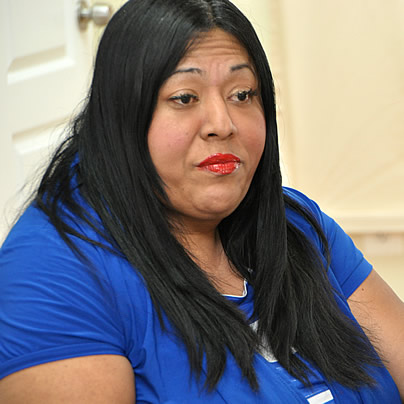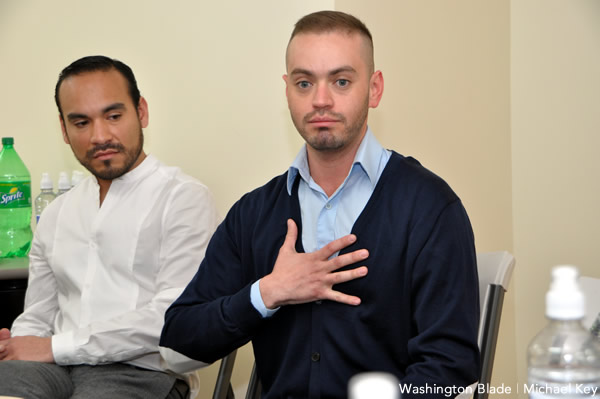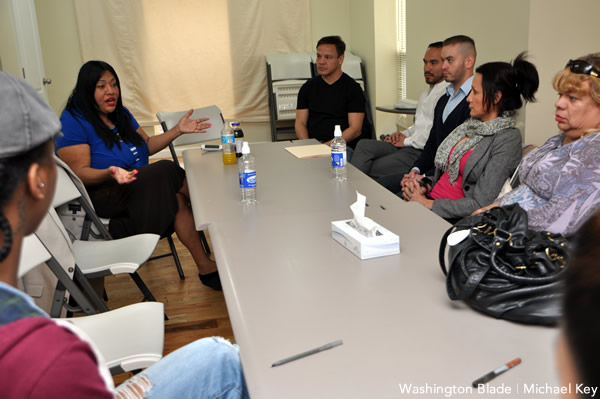Local
Casa Ruby seeks to expand jobs program
Dozens of clients attend employment classes, workshops each month

D.C. resident Lovely Allen worked at a local Safeway when she was a teenager, but she complained the supermarket’s managers did not provide her co-workers with any sensitivity training.
“They called me he and stuff like that,” Allen, 22, said while at Casa Ruby on Georgia Avenue in Northwest Washington on Monday. “It’s uncomfortable when you’re trying to work somewhere and someone’s referring to you as something that you don’t agree with and you don’t identify as.”
Allen is among the nearly dozen people enrolled in Casa Ruby’s job placement and training classes with whom the Washington Blade spoke on Monday.
The Latino LGBT community center offers a variety of vocational courses that include teaching clients how to become medical technicians who can administer HIV, hepatitis and glucose tests to patients.
Eduardo Carcamo works with Casa Ruby clients who want to become make-up artists, while designer Felix Montes has offered to instruct those interested in entering the fashion industry. Interior designer Enrique Coronado, who studied in Spain, also works with Casa Ruby clients.
The classes typically last two months, and participants receive a certificate from the instructor and from Casa Ruby upon completion.
More than 60 people graduated from the latest medical technician class that ended in December. A dozen clients attended Casa Ruby’s latest make-up artistry course, while roughly 30 participants take part in job consulting and skills development workshops each month.
Both Montes and Coronado reached out to Casa Ruby for job placement and other services before they offered to work with clients.
“It is an environment where people are welcome,” Casa Ruby CEO Ruby Corado said. “There are schools out there where unfortunately people don’t feel welcome.”
D.C. resident Ismael Delgado, who is originally from Paraguay, is among those who graduated from the make-up artistry class last December.
He told the Blade he wanted to enter cosmotology school, but could not afford the $25,000 tuition.
“They are very expensive,” Delgado said.
Teri Williams enrolled in Casa Ruby’s program after she received a referral through Project Empowerment, the city’s jobs training program for transgender Washingtonians.
“My education level is not really where it should be for my age because I was doing other things when I was coming up,” the D.C. resident who just turned 50 said. “The thing is now I need to be able to sustain my life and I need financial assistance, which I want to provide for myself. I honestly want to work.”
Montes, who is originally from Puerto Rico, said he is working with Casa Ruby because he wants to help other people find work who are unable to afford expensive job training courses.
“Everyone has talent,” he said. “Nobody can say that they do not have a talent. It is a question of what you’re looking for, what you like to do and your career will be what you want it to be.”
Statistics continue to show Latinos and other underrepresented groups within the LGBT community remain particularly vulnerable to employment discrimination.
A 2011 study from the National Center for Transgender Equality and the National Gay and Lesbian Task Force found trans people are nearly twice as likely to be unemployed than the general population. The jobless rate among trans people of color is four times higher than the national average.
The survey reported 97 percent of respondents experienced harassment or mistreatment while at work. Nearly half of them said a prospective employer did not hire them because they were transgender. And 26 percent of respondents indicated they lost their jobs because of their gender identity and expression.
NCTE and the Task Force further noted 15 percent of respondents earned less than $10,000 a year. This figure among blacks who took part in the survey jumped to 35 percent.
The D.C. Department of Employment Services in 2011 launched Project Empowerment as a way to help reduce unemployment and poverty rates among trans Washingtonians.
More than 70 people have graduated from the program since its inception, but those with whom the Blade spoke at Casa Ruby said city officials can do more to help trans people and D.C. residents who are looking for work.
“Project Empowerment needs to be a little longer,” Williams said. “Once you get used to working and you’re changing your ways, you’re right back out there if you don’t get your job right away.”
Allen said she had tried to enroll in Project Empowerment a couple of months ago, but she said it was full. She is scheduled to start with the program “in a few days” after she and Corado reached out to Mayor Vincent Gray.
“I do feel there’s a lack of jobs here for the gay and transgender people,” Allen said. “A lot of times I guess they [prospective employers] worry about how it makes their places look if you hire trans people or Latinas. If I can work then why shouldn’t I be able to?”
Casa Ruby has not received any grant money from the D.C. Department of Employment Services to fund the jobs program since it officially opened last June. Corado said she is planning to reach out to private donors, foundations, non-profit organizations and other groups that may want to invest in them.
Meanwhile, participants hope city officials work to address some of the underlying issues they maintain prevent LGBT Washingtonians from gaining employment.
“Here there is a lot of discrimination,” Coronado said. “I have a resume with my studies, with specific jobs but I have a Latino last name — not an American last name.”
He added the language barrier and a lack of knowledge of the benefits the city offers to those who are seeking employment and the rights they have as D.C residents are among the additional barriers.
Delgado said he would like to see the Gray administration do more to address these issues.
“We are preparing a group of people that will empower themselves, others,” Larry Villegas of Casa Ruby added as he discussed a previous jobs program for people with HIV/AIDS. Companies were able to call and look at resumes when they needed to hire someone. “We need to fill that gap from the officials to say OK we need to revamp that program that could hire anybody that is skilled.”
Allen and other Casa Ruby clients acknowledged it is their responsibility to take the initiative to find a job. They added discrimination and other barriers make this task exceedingly difficult.
“No one is going to go home and change from the woman that they are and put on a fitted hat and a pair of tennis shoes to get a job,” Allen said. “I don’t think anybody should have to do that. I don’t think you should have to alter your appearance or who you are to gain employment.”
District of Columbia
D.C. police arrest man for burglary at gay bar Spark Social House
Suspect ID’d from images captured by Spark Social House security cameras

D.C. police on Feb. 18 arrested a 63-year-old man “of no fixed address” for allegedly stealing cash from the registers at the gay bar Spark Social House after unlawfully entering the bar at 2009 14th St., N.W., around 12:04 a.m. after it had closed for business, according to a police incident report.
“Later that day officers canvassing for the suspect located him nearby,” a separate police statement says. “63-year-old Tony Jones of no fixed address was arrested and charged with Burglary II,” the statement says.
The police incident report states that the bar’s owner, Nick Tsusaki, told police investigators that the bar’s security cameras captured the image of a man who has frequently visited the bar and was believed to be homeless.
“Once inside, the defendant was observed via the establishment’s security cameras opening the cash register, removing U.S. currency, and placing the currency into the left front pocket of his jacket,” the report says.
Tsusaki told the Washington Blade that he and Spark’s employees have allowed Jones to enter the bar many times since it opened last year to use the bathroom in a gesture of compassion knowing he was homeless. Tsusaki said he is not aware of Jones ever having purchased anything during his visits.
According to Tsusaki, Spark closed for business at around 10:30 p.m. on the night of the incident at which time an employee did not properly lock the front entrance door. He said no employees or customers were present when the security cameras show Jones entering Spark through the front door around 12:04 a.m.
Tsusaki said the security camera images show Jones had been inside Spark for about three hours on the night of the burglary and show him taking cash out of two cash registers. He took a total of $300, Tsusaki said.
When Tsusaki and Spark employees arrived at the bar later in the day and discovered the cash was missing from the registers they immediately called police, Tsusaki told the Blade. Knowing that Jones often hung out along the 2000 block of 14th Street where Spark is located, Tsusaki said he went outside to look for him and saw him across the street and pointed Jones out to police, who then placed him under arrest.
A police arrest affidavit filed in court states that at the time they arrested him police found the stolen cash inside the pocket of the jacket Jones was wearing. It says after taking him into police custody officers found a powdered substance in a Ziploc bag also in Jones’s possession that tested positive for cocaine, resulting in him being charged with cocaine possession in addition to the burglary charge.
D.C. Superior Court records show a judge ordered Jones held in preventive detention at a Feb. 19 presentment hearing. The judge then scheduled a preliminary hearing for the case on Feb. 20, the outcome of which couldn’t immediately be obtained.
District of Columbia
Judge rescinds order against activist in Capital Pride lawsuit
Darren Pasha accused of stalking organization staff, board members, volunteers

A D.C. Superior Court judge on Feb.18 agreed to rescind his earlier ruling declaring local gay activist Darren Pasha in default for failing to attend a virtual court hearing regarding an anti-stalking lawsuit brought against him by the Capital Pride Alliance, the group that organizes D.C.’s annual Pride events.
The Capital Pride lawsuit, initially filed on Oct. 27, 2025, accuses Pasha of engaging in a year-long “course of conduct” of “harassment, intimidation, threats, manipulation, and coercive behavior” targeting Capital Pride staff, board members, and volunteers.
In his own court filings without retaining an attorney, Pasha has strongly denied the stalking related allegations against him, saying “no credible or admissible evidence has been provided” to show he engaged in any wrongdoing.
Judge Robert D. Okum nevertheless on Feb. 6 approved a temporary stay-away order requiring Pasha to stay at least 100 feet away from Capital Pride’s staff, volunteers, and board members until the time of a follow-up court hearing scheduled for April 17. He reduced the stay-away distance from 200 yards as requested by Capital Pride.
In his two-page order issued on Feb. 18, Okun stated that Pasha explained that he was involved in a scooter accident in which he was injured and his phone was damaged, preventing him from joining the Feb. 6 court hearing.
“Therefore, the court finds there is a good cause for vacating the default,” Okun states in his order.
At the time he initially approved the default order at the Feb. 6 hearing that Pasha didn’t attend, Okun scheduled an April 17 ex parte proof hearing in which Capital Pride could have requested a ruling in its favor seeking a permanent anti-stalking order against Pasha.
In his Feb. 18 ruling rescinding the default order Okun changed the April 17 ex parte proof hearing to an initial scheduling conference hearing in which a decision on the outcome of the case is not likely to happen.
In addition, he agreed to consider Pasha’s call for a jury trial and gave Capital Pride 14 days to contest that request. The Capital Pride lawsuit initially called for a non-jury trial by judge.
One request by Pasha that Okum denied was a call for him to order Capital Pride to stop its staff or volunteers from posting information about the lawsuit on social media. Pasha has said the D.C.-based online blog called DC Homos, which Pasha claims is operated by someone associated with Capital Pride, has been posting articles portraying him in a negative light and subjecting him to highly negative publicity.
“The defendant has not set forth a sufficient basis for the court to restrict the plaintiff’s social media postings, and the court therefore will deny the defendant’s request in his social media praecipe,” Okun states in his order.
A praecipe is a formal written document requesting action by a court.
Pasha called the order a positive development in his favor. He said he plans to file another motion with more information about what he calls the unfair and defamatory reports about him related to the lawsuit by DC Homos, with a call for the judge to reverse his decision not to order Capital Pride to stop social media postings about the lawsuit.
Pasha points to a video interview on the LGBTQ Team Rayceen broadcast, a link to which he sent to the Washington Blade, in which DC Homos operator Jose Romero acknowledged his association with Capital Pride Alliance.
Capital Pride Executive Director Ryan Bos didn’t immediately respond to a message from the Blade asking whether Romero was a volunteer or employee with Capital Pride.
Pasha also said he believes the latest order has the effect of rescinding the temporary stay away order against him approved by Okun in his earlier ruling, even though Okun makes no mention of the stay away order in his latest ruling. Capital Pride attorney Nick Harrison told the Blade the stay away order “remains in full force and effect.”
Harrison said Capital Pride has no further comment on the lawsuit.
District of Columbia
Trans activists arrested outside HHS headquarters in D.C.
Protesters demonstrated directive against gender-affirming care

Authorities on Tuesday arrested 24 activists outside the U.S. Department of Health and Human Services headquarters in D.C.
The Gender Liberation Movement, a national organization that uses direct action, media engagement, and policy advocacy to defend bodily autonomy and self-determination, organized the protest in which more than 50 activists participated. Organizers said the action was a response to changes in federal policy mandated by Executive Order 14187, titled “Protecting Children from Chemical and Surgical Mutilation.”
The order directs federal agencies and programs to work toward “significantly limiting youth access to gender-affirming care nationwide,” according to KFF, a nonpartisan, nonprofit organization that provides independent, fact-based information on national health issues. The executive order also includes claims about gender-affirming care and transgender youth that critics have described as misinformation.
Members of ACT UP NY and ACT UP Pittsburgh also participated in the demonstration, which took place on the final day of the public comment period for proposed federal rules that would restrict access to gender-affirming care.
Demonstrators blocked the building’s main entrance, holding a banner reading “HANDS OFF OUR ‘MONES,” while chanting, “HHS—RFK—TRANS YOUTH ARE NO DEBATE” and “NO HATE—NO FEAR—TRANS YOUTH ARE WELCOME HERE.”
“We want trans youth and their loving families to know that we see them, we cherish them, and we won’t let these attacks go on without a fight,” said GLM co-founder Raquel Willis. “We also want all Americans to understand that Trump, RFK, and their HHS won’t stop at trying to block care for trans youth — they’re coming for trans adults, for those who need treatment from insulin to SSRIs, and all those already failed by a broken health insurance system.”
“It is shameful and intentional that this administration is pitting communities against one another by weaponizing Medicaid funding to strip care from trans youth. This has nothing to do with protecting health and everything to do with political distraction,” added GLM co-founder Eliel Cruz. “They are targeting young people to deflect from their failure to deliver for working families across the country. Instead of restricting care, we should be expanding it. Healthcare is a human right, and it must be accessible to every person — without cost or exception.”

Despite HHS’s efforts to restrict gender-affirming care for trans youth, major medical associations — including the American Medical Association, the American Academy of Pediatrics, and the Endocrine Society — continue to regard such care as evidence-based treatment. Gender-affirming care can include psychotherapy, social support, and, when clinically appropriate, puberty blockers and hormone therapy.
The protest comes amid broader shifts in access to care nationwide.
NYU Langone Health recently announced it will stop providing transition-related medical care to minors and will no longer accept new patients into its Transgender Youth Health Program following President Donald Trump’s January 2025 executive order targeting trans healthcare.
-

 National5 days ago
National5 days agoTrump falsely links trans people to terrorism
-

 Virginia5 days ago
Virginia5 days agoFellow lawmakers praise Adam Ebbin after Va. Senate farewell address
-

 National5 days ago
National5 days agoLGBTQ activists mourn the Rev. Jesse Jackson
-

 Massachusetts4 days ago
Massachusetts4 days agoEXCLUSIVE: Markey says transgender rights fight is ‘next frontier’



















